This simulation presents the Keystone Computers and Networks, Inc. (Keystone Cash Work Memo for the general account and petty cash prepared by two members of
This simulation presents the Keystone Computers and Networks, Inc. (Keystone Cash Work Memo for the general account and petty cash prepared by two members of your audit team- your responsibility is to evaluate various statements included in that document, considering the various exhibits. Background financial and other information on Keystone is included in Appendix 6C of Chapter 6.
The controller of Keystone Computer and networks Inc. (Keystone) a non issuer, prepared six exhibits relating to Keystone's General Account cash position at year 5 year end. A new audit assistant with your CPA firm has begun the audit of cash but has a number of questions and comments based on a quick examination of the exhibits, now included in the working papers, and a discussion of some matters with the controller of keystone.
Required
Your job as senior on the engagement is to review the various points made by the assistant, including consideration of the exhibits. For each of the sentences called out in the points on the document, determine if the current language is appropriate as is, should be removed altogether, or replaced with any of the provided alternatives. Links to each of the exhibits are provided in the document, but are available in the list below for convenience
Document
(For each Document Callout, choose the correct Determination from the table below.)
| To: | Audit Senior |
| From: | Audit Assistant |
| Re: | Keystone Computers & Networks, Inc. General Account Cash Work |
| Date: | January 11, year 6 |
I have a number of points related to the auditing procedures I applied to Keystone’s cash accounts as follow:
- Cash Lead Schedule (Exhibit 1): The company’s petty cash (account 101) is stated at $50. But the petty cash custodian acknowledges that there was only $41 in the account as of year-end because a $9.00 expenditure for supplies had been made. This overstates cash by $9.00, although pass adjustment due to immateriality. (Callout #1)
- Bank Reconciliation (Exhibit 2): The account receivable collected by the bank was paid by a client directly to the bank on December 29, year 5. Keystone recorded the entry for the proper amount on January 2, year 6. No adjusting entry is needed as of 12/31/year 5. (Callout #2)
- Standard Bank Confirmation (Exhibit 3): The bank representative added a comment to the confirmation. The comment is a “boilerplate” disclaimer of liability that definitely does not affect the reliability of the information we obtained. (Callout #3)
- Deposit in Transit (Exhibit 4): The deposit in transit seems properly handled on the bank reconciliation (Exhibit 2) with a debit to cash. (Callout #4)
- Outstanding Checks (Exhibit 5) and Bank Transfer Schedule (Exhibit 6): Check 2034 from the bank transfer schedule was omitted from the list of outstanding checks. This is because it was not written until 1/1/year 6. (Callout #5)
- Outstanding Checks (Exhibit 5): The long-outstanding check for $200 will probably never be cashed as the company has attempted to communicate with the payee and failed. Because the state does not require submission of such funds, we should suggest to the client that the $200 check be deleted from the outstanding check list; no adjusting journal entry seems necessary. (Callout #6)
- Outstanding Checks (Exhibit 5): Keystone’s first bank statement in year 6 included check 2027 dated on 12/30 for $1,500 to Jenco Corp. I found the check to be properly recorded in the cash disbursements journal as of 12/30/year 5. No further audit response is necessary related to check 2027. (Callout #7)
- Bank Transfer Schedule (Exhibit 6): Check 2032 appears to result in the cash being recorded in both accounts per books as of year-end and thus overstates total cash by $1,500 at year-end. (Callout #8)
Callouts
1. Although pass adjustment due to immateriality
2. No adjusting entry is needed as of 12/31/year 5.
3. The comment is a boilerplate disclaimer of liability that definitely does not affect the reliability of the information we obtained.
4. The deposit in transit seems properly handled on the bank reconciliation (exhibit 2) with a debit to cash.
5. This is because it was not written until 1/1/year 6.
6....be deleted from the outstanding check list; no adjusting journal entry seems necessary.
7. No further audit response is necessary related to check 2027.
8. Check 2032 appears to result in the cash being recorded in both accounts per books as of year end and thus overstates total cash by $1,500 at year-end.
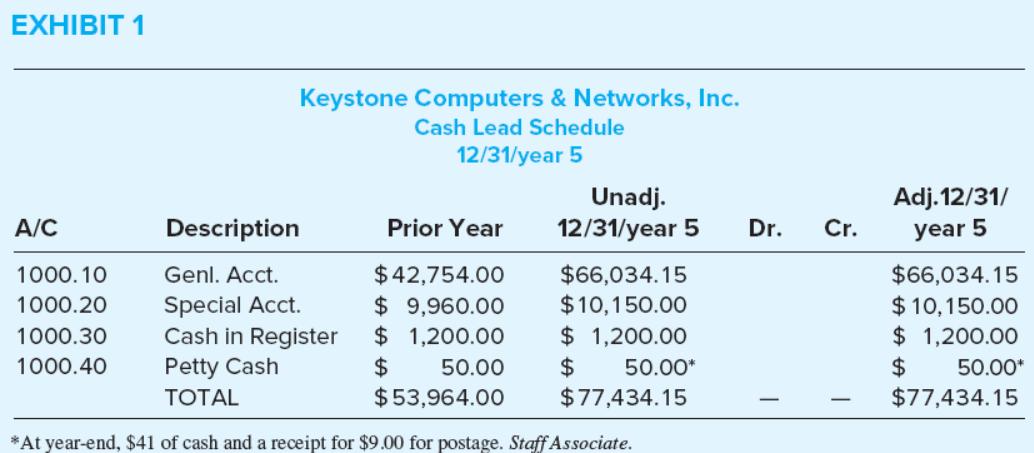
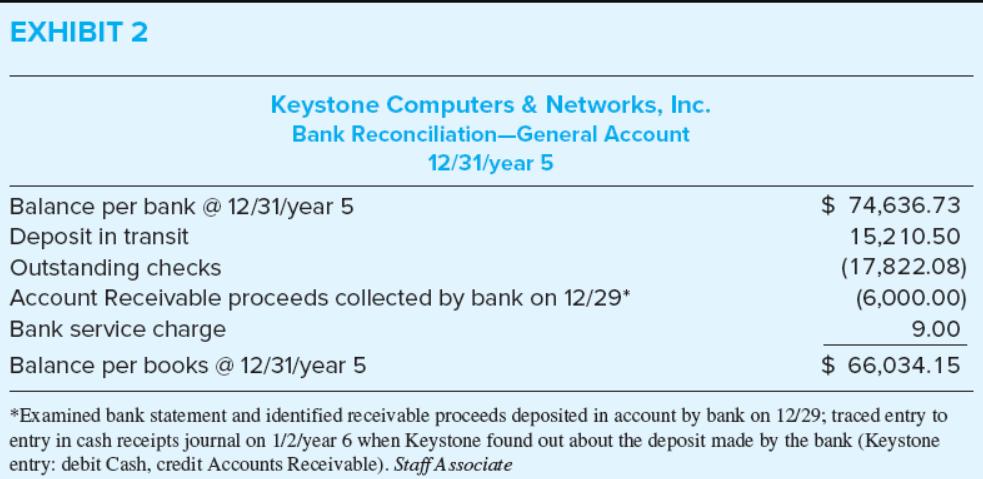
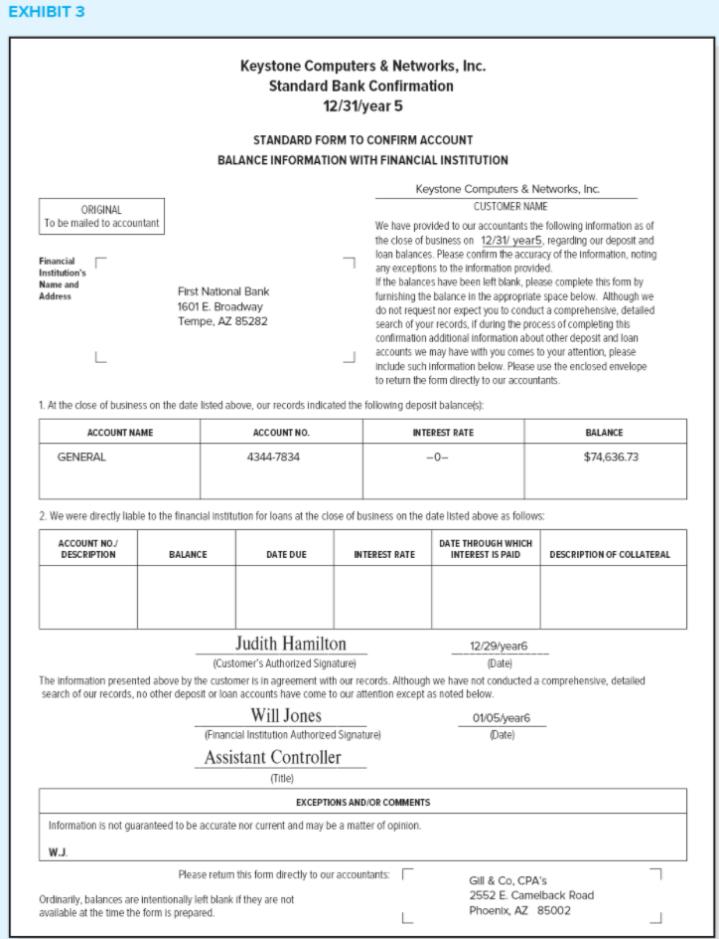
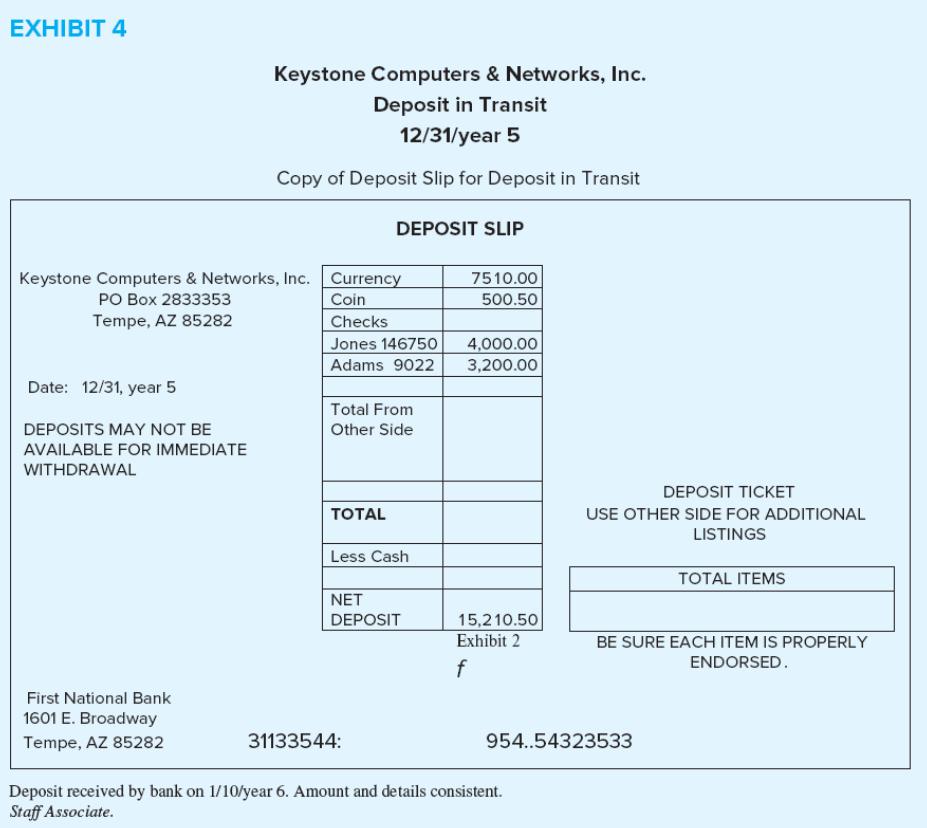
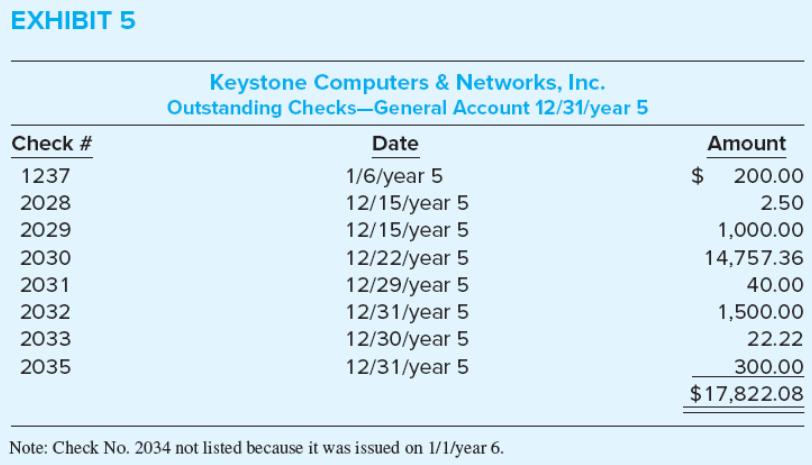
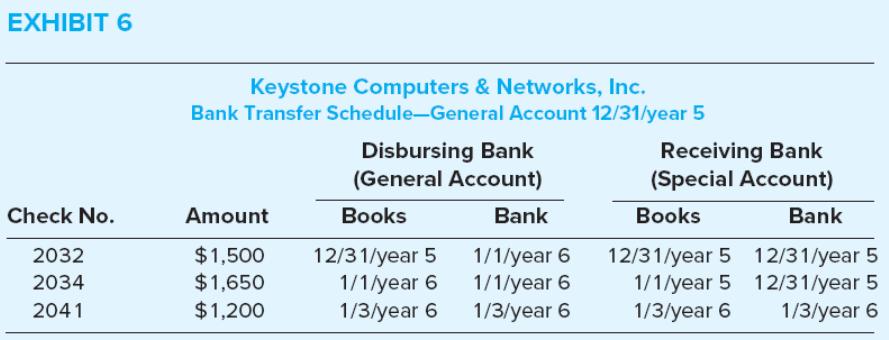
EXHIBIT 1 Keystone Computers & Networks, Inc. Cash Lead Schedule 12/31/year 5 Unadj. 12/31/year 5 Adj.12/31/ Cr. A/C Description Prior Year Dr. year 5 $66,034.15 $ 10,150.00 $ 1,200.00 24 $77,434.15 $42,754.00 $66,034.15 $10,150.00 $ 1,200.00 24 $77,434.15 1000.10 Genl. Acct. Special Acct. Cash in Register Petty Cash $ 9,960.00 $ 1,200.00 24 $53,964.00 1000.20 1000.30 1000.40 50.00 50.00* 50.00* TOTAL | *At year-end, $41 of cash and a receipt for $9.00 for postage. Staff Associate.
Step by Step Solution
3.41 Rating (167 Votes )
There are 3 Steps involved in it
Step: 1
Revenue cycle controls 11A1 Sales controls Control Error or Fraud Controlled Application controls are applied when customer orders are entered by the ...
See step-by-step solutions with expert insights and AI powered tools for academic success
Step: 2

Step: 3

Ace Your Homework with AI
Get the answers you need in no time with our AI-driven, step-by-step assistance
Get Started


